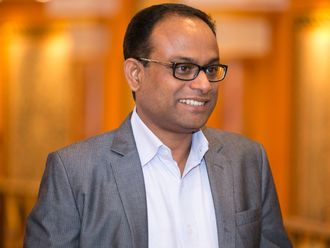Abu Dhabi: Adrian McDonald, EMC Corporation’s president for Europe, Middle East, and Africa is very confused at the moment. He has just one million-dollar-question…actually, it’s more of a $67-billion-question.
Why is Michael Dell, founder and chief executive of Dell, so keen on acquiring EMC?
It’s the same question plenty of technology experts are asking after Dell announced it has reached a definitive agreement to acquire EMC in a deal worth $67 billion, making it the largest technology acquisition ever.
The combined revenue from both companies once the transaction is completed is going to be around $80 billion.
“Candidly, from a personal perspective, Michael Dell doesn’t need to do this. You could read in any magazine what Michael Dell is worth. He doesn’t need to do this. He’s doing it for the fun. He likes this stuff; he loves technology, he’s passionate about the industry, and he’s not putting together this $80-billion-company to make it a $60-billion-dollar company – it’s quite the opposite,” EMC’s McDonald said.
He pointed that when Dell expressed interest in the acquisition, EMC had not even been put up for sale, and that news came as a surprise to EMC.
The hefty price tag on that deal is also exacerbated by the fact that Dell will have to borrow billions to finance the deal and even sell some non-core assets. Still, Dell said he was thrilled about the deal, which, according to McDonald, didn’t come easy for the CEO.
“Michael Dell didn’t ask once. Michael Dell asked many times on this particular subject, and the board of EMC would have said no on many occasions, and finally, Michael made an offer that the board couldn’t seriously refuse in the interest of the shareholders,” he said.
Revenue upside
And while he admits Dell doesn’t need to acquire EMC, McDonald is confident about the significance of this deal, adding that it will bring a revenue upside of circa $4 billion.
“The Michael Dell that I knew years ago is the Michael Dell of today, and he won’t say this and I won’t say it, but the plans will be for substantial growth. We believe that the market itself is going to have new sources of demand that we’ll be ideally suited to play in.
We believe that the market will consolidate on mass, and we believe there’s a growing space for a really capable technology company to drive cloud-making infrastructure for our companies for an extended period of time,” he said.
According to Dell himself, this acquisition makes for “a dream combination” as both companies “complement each other beautifully.”
Faster innovation
In a statement issued by Dell, the CEO said the acquisition will help accelerate innovation in the industry.
“We’ll be best positioned to maximize legacy investments with leadership in storage, servers, virtualization and PCs. And best positioned to build a bridge to the future through leading innovation in digital transformation, software-defined data center, converged infrastructure, hybrid cloud, mobile and security,” he said.
As a company, Dell has seen lower demand for personal computers, the very sector Dell became famous for in the 1980s and 1990s. By mid-2000s when competition was tougher in the market, Dell cut its PC prices. It also started looking for ways to diversify its product offerings, acquiring, for example, EqualLogic, a storage company, and launching its first modular data center for cloud-computing applications.
The EMC deal also appears to be part of such plans to diversify away from PCs.
Plans to finalize the acquisition deal between July and October of this year are still on track, with boards of both companies expected to vote on the acquisition in the coming weeks. Authorities in all jurisdictions (except for China) have waived the acquisition through.
“Currently, we would be thinking of July to October with an emphasis on August/September timeframe to close the deal. Whilst we will be owned by Dell, our operational model between now and February 2017 will remain as it is, and in terms of how we’re going to market, that’s currently under discussion,” EMC’s McDonald said.
He was speaking on Wednesday on the sidelines of the EMC CIO Summit in Abu Dhabi.












